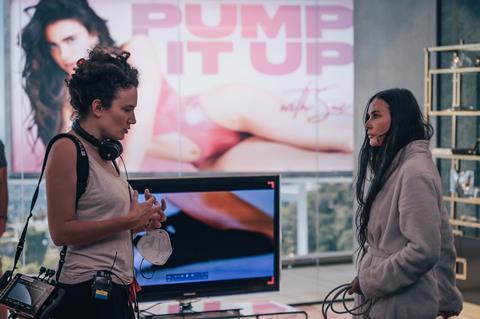Coralie Fargeat tells Rebecca Leffler about her amour for gore — and Demi Moore — and how she made hit feminist body-horror The Substance her own way

Much like Demi Moore’s character Elisabeth Sparkle in feminist body horror The Substance and her younger alter ego Sue (Margaret Qualley), director Coralie Fargeat explains that “the story of the film and the way of making it are very closely linked”.
The French writer/director — who is also a producer of the film, about an ageing actress who goes to extreme measures to preserve her youth with devastating consequences — pushed the envelope both creatively and professionally to get it made.
The Substance has shocked audiences across the globe since premiering in Competition at Cannes in May, earning Fargeat the best screenplay award. The story follows Moore’s Sparkle, an acclaimed actress turned TV fitness-show host who is fired from her job when her boss (Dennis Quaid) decides she is too old. Sparkle opts to take a mysterious drug that births her younger doppelganger in what is a merciless critique of society’s unattainable beauty standards. “Society places expectations on you when you’re a woman,” says Fargeat, “and the pressure that makes you feel so badly if you don’t live up to them.”
‘Enough already’
While she says the kernel of the film dates from “a long time ago”, the narrative took on another layer more recently when the filmmaker entered her 40s with “violent feelings of ‘life is over for me’”. So she set out to make “a feminist movie to open everyone’s eyes to these issues and say, ‘Enough already. Let’s put an end to this.’”
After a series of award-winning shorts, Fargeat broke through with her first feature, 2017’s Revenge — a half-French and half-English-language rape retaliation thriller that premiered at Toronto and was released by Neon and then Shudder in North America.
“I felt this was the time for me to start thinking about making a movie with American partners while still preserving my way of doing things, which is very much European,” says Fargeat of her follow-up. “However, I didn’t want to fall into the trap of other French directors who go to the US to make movies they haven’t written and who don’t get the creative control on their project.”
Fargeat, via her own Paris-based Blacksmith, partnered with Working Title co-chairs Eric Fellner and Tim Bevan. “They have one leg in the US and one leg in Europe, which was very relevant for this film,” she explains, calling the Universal Pictures subsidiary “a strong bridge between these two worlds”.
For Fargeat, her film’s subject mirrors her own attempt to take control of her life and career. Being a producer, she says, was “a way to shape the shooting to the needs of this specific movie to give maximum freedom”.
From the start, she says, “I knew the film was going to be bold and provocative.” She opted to write the script on spec. “It was so the people coming on board would really know what I wanted to do. When I write, I write in very precise detail everything I’m going to film.”
The road to Hollywood was not always easy. Fargeat says that she faced “a lot of resistance” in France making her early shorts. “Revenge was a fight to get made — it’s not the type of film we’re used to making in France,” she says. “Every door was closed so I had to come in by the window to make that film.”
The Substance goes further, pushing the boundaries of grotesque body horror, all with darkly comic undertones. “It’s not a movie you can put in a box. It’s a genre film, but it’s also funny,” explains Fargeat. “It’s unconventional, so I knew that in France I would have limitations.”
One particularly impactful scene required 5,000 gallons of fake blood. “Everything had to be in excess. It had to reflect the level of violence I felt in everyday life regarding those issues.”
Fargeat credits Working Title with giving her the freedom to let her imagination run wild, albeit one “far from movies they were used to making. They understood this movie was about a vision expressing itself and that its strength was its originality. It doesn’t mean we always agreed on everything, but they were always supporting, pushing me to do what I wanted to do as a filmmaker.”
Staying home

The Substance — which is set entirely in Los Angeles — benefited from France’s international tax credit and was shot wholly in the country between May and October 2022, mostly at Epinay Studios in the Paris region and on location in the Côte d’Azur.
Fargeat opted to shoot the $18m film in France for both financial and creative reasons. “Filming in Los Angeles costs a fortune. We didn’t have a huge budget, so I wanted all the money to go on screen.” She also wanted to reteam “with my crew, people I’m used to working with who are also open to not following the rules because, for this movie, we had to invent our own rules”.
Shooting in France also gave her more time, namely 109 days in total. “I could shape the shoot according to my needs as a director,” she says for example mastering “a specific way to handle all the close-ups that are an extremely important part of my mise-en-scène”. This included an extra 21 days with a very limited crew of between eight and 15 people “to shoot all the close-up inserts and prosthetics animation. I don’t need 80 people, but I do need time.”
While not her native language, Fargeat spent two years writing the script in English. “[It would] help me reach as many people as possible,” she says. “My language was born with the movies I watched, which were mostly American films and mostly genre films — movies that made me feel alive, powerful and free, that took me to a mysterious, powerful world I couldn’t access in my everyday life.”
To cast the character of Elisabeth Sparkle, Fargeat says she always knew she was searching for “an actress who would be iconic” — a challenge as she would be asking “an actress to confront her biggest phobia”. She confesses that several passed on the role before Moore’s name entered the conversation.
“I thought she was so in control of her image, she would never want to take such a risk,” admits Fargeat. But Moore came back saying she loved the script. When they met, Fargeat spent time explaining the intensity of the role — including the physical demands of prosthetics, hours in the make-up chair, “and what she would be asked to do on a daily basis” for the long shoot, including several scenes with nudity.
Moore quickly said yes, and her performance is now being described as career-defining. “Within five minutes, we knew the story resonated with both of us in the same way,” says Fargeat. “She had experienced firsthand so much of what was in the script.”
Citing Moore’s “instinct and intelligence”, Fargeat says the actress understood she must “go all-in” or else not play the role. “Demi Moore, she really rocks. She is rock ’n’ roll, she is the actress I needed to give life to the character, to this world.”
Mubi acquired rights to North America, the UK and multiple other territories ahead of The Substance’s Cannes premiere, releasing it in late September, and grossing $73m worldwide at press time — the company’s biggest hit to date.
Fargeat hopes its success can incite change in the way women view themselves and are treated. “I have worked hard for that freedom, to for once allow myself to think, ‘Who you are and what you want to do is worth existing in the world. You deserve to have your voice out there and be seen for who you really are, even if it doesn’t meet society’s expectations,’ which is the theme of the film itself.”


































No comments yet